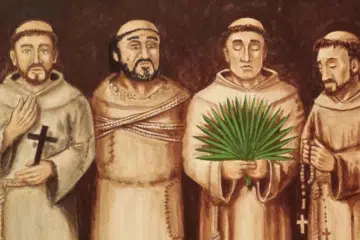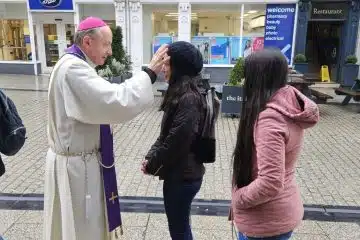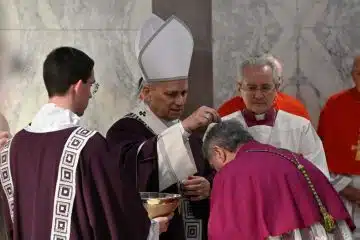Mexican bishop says episcopacy in his country and U.S. must work together
Wednesday, May 5, 2010
By David Eck
ARCHDIOCESE — Catholic bishops in Mexico and the United States must work together to address the complex, ethical issues of immigration, Mexican Bishop Eduardo Carmona Ortega told Catholics in the Archdiocese of Cincinnati.
Mexican church leaders want their parish communities to understand that migration hurts Mexican families. Likewise, Americans must be made aware that immigrants need to be accepted, he said.
The bishop’s April 16-26 visit was particularly timely, coming just as Arizona State Gov. Jan Brewer was preparing to sign a new immigration law that the U.S. bishops, among others, are decrying for its harsh treatment of immigrants. Arizona is one of three U.S. states that shares a border with Mexico.
 |
| Mexican Bishop Eduardo Carmona Ortega, left, with his assistant and translator, Father Jaime Rojas. (CT/David Eck) |
Nationwide, rallies in support of federal comprehensive immigration reform long planned for May 1 were expected to have new focus and determination, as supporters of comprehensive reform zeroed in on the Arizona law as a consequence of Congress’ delay in dealing with the dysfunctional immigration system.
The bishops of the United States and Mexico issued a joint pastoral letter in 2003, Strangers no Longer: Together on the Journey of Hope, detailing clear Catholic social justice principals to guide immigration reforms.
“It is a global problem that we have to solve together,” Bishop Ortega said through Father Jaime Rojas, his assistant and translator. “You cannot solve a problem isolated.”
Church officials in Mexico are also working with Mexican legislators to distinguish humanitarian aid from human trafficking.
“Mexico is facing the problem of immigration in different ways,” Bishop Ortega said.
Bishop Ortega is of the Puerto Escondido diocese in Oaxaca in the southwestern portion of Mexico along the Pacific Ocean. There are about a half-million Catholics in the diocese.
The visit to Cincinnati was a follow-up to a trip to Mexico made last December by a group of 14 pastors, parishioners and archdiocesan staff from the Cincinnati archdiocese.
During his visit here, Bishop Ortega spent time with migrants from his diocese who now work in the Cincinnati archdiocese. He celebrated Mass at St. Denis Parish in Versailles, the shrine at Maria Stein, St. Julie Billiart in Hamilton and St. Patrick Parish in Bellefontaine; attended a community organizing assembly at Immaculate Conception Church in Dayton, met with Cincinnati Archbishop Dennis M. Schnurr and representatives of the archdiocesan offices, delivered the keynote address at the annual Su Casa banquet at the Cintas Center at Xavier University, met with students at St. Peter in Chains School in Hamilton and at Xavier University, and participated in the “Weavers of Justice” retreat in Dayton.
Cincinnati parishes can learn to celebrate the liturgy in a more lively style, particularly on feast days, and Puerto Escondido parishes can learn from the structure and perseverance of parishes in Cincinnati, the bishop said.
“You are very well organized,” Bishop Ortega said through his translator. “You have clear objectives, and you struggle to meet those objectives.”
Visits such as the one made by the Cincinnati delegation to Mexico and this visit from the bishop can foster parish-to-parish twinning opportunities between Cincinnati and Puerto Escondido, said Mike Gable, director of the Cincinnati archdiocesan Mission Office.
“We went to meet people that work with migrants or people that are migrating,” he explained. “We talked to people who are trying to protect people who are coming through Mexico.”
David Eck can be reached at [email protected].
See related story — Bishops: Immigration reform framework a start, needs work









